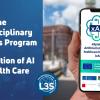Artificial intelligence in healthcare: Applications, risks, and ethical and societal impacts
In recent years, the use of artificial intelligence (AI) in medicine and healthcare has been praised for the great promise it offers, but has also been at the centre of heated controversy.
This study from the EPRS (European Parliament Research Service) offers an overview of how AI can benefit future healthcare, in particular increasing the efficiency of clinicians, improving medical diagnosis and treatment, and optimising the allocation of human and technical resources.
The report identifies and clarifies the main clinical, social and ethical risks posed by AI in healthcare, more specifically:
- potential errors and patient harm;
- risk of bias and increased health inequalities;
- lack of transparency and trust;
- vulnerability to hacking and data privacy breaches.
The study proposes mitigation measures and policy options to minimise these risks and maximise the benefits of medical AI, including multi-stakeholder engagement through the AI production lifetime, increased transparency and traceability, in-depth clinical validation of AI tools, and AI training and education for both clinicians and citizens.





